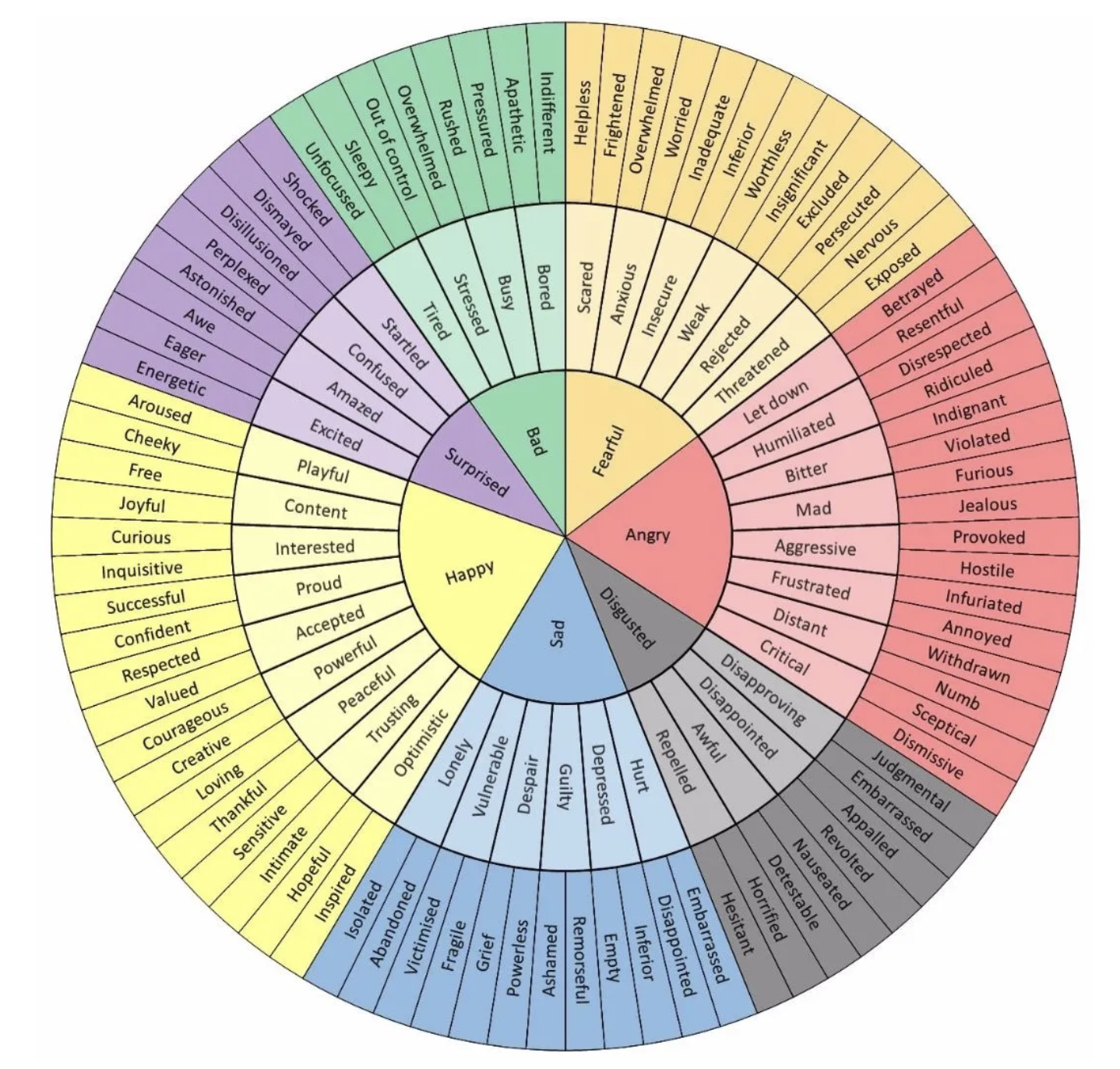Wise Online - View Week
Week 3- Processing Difficult Emotions in a Healthy Way
WISE Recap
- Navy Seal Box Breathing Method (in for 4, hold 4, out 4, hold 4). Imagine the box is your favourite colour for even greater sensory awareness. If it is hard to imagine a box you may like to trace your mind around a square piece of paper or your computer screen.
- Emotional Intelligence (EQ) is a key predictor of mental health. Our EQ refers to our ability to be aware of, regulate, and express our emotions and to understand, and respond skilfully, to the emotions of others.
- This week we are learning to stay present to the unpleasant. We are cultivating our ability and resilience to tolerate uncomfortable and unpleasant emotions. I encourage you to get curious about what is happening in the mind and body during moments of difficulty. This can help us become more emotionally intelligent and more psychologically resilient.
- Studies have shown that suppressing emotions actually endangers your health and well-being, both physically and psychologically. Emotional suppression (having a stiff upper lip or “sucking it up”) might decrease outward expressions of emotion but not the inner emotional experience. In other words, suppression doesn’t make the emotion go away, it just stays inside causing more pain.
- Research shows that struggling with, arguing with, trying to drown out or push away negative thoughts and emotions only amplifies them and makes things worse. In other words, you will keep thinking about and holding onto those thoughts and emotions you’re trying to avoid. Suppression gets held in the body and creates a host of downstream effects including anxiety, depression, stress-related illness, all the way to substance abuse, PTSD and suicide. Distraction and avoidance doesn’t make the feelings get smaller or disappear. Remember the devils snare in Harry Potter- ‘what we resist persists!’.
- I invite you this week to practice giving yourself space to notice (and feel) your emotions and to let go of the ‘story-line’ associated with difficult emotions. Meet whatever is in your body in terms of sensations (heat, heart racing, pulsing, tension, bracing etc) with gentleness and kindness. You may like to imagine you are breathing in and around these sensations to create space for them like we practiced in the session. You may like to say to yourself “whatever it is it’s already here”. “I don’t have to like what is here but I am just going to make space for it”. If you are experiencing stress, anxiety, trauma or panic you might like to acknowledge AmyG and let her know that you are safe.
- ‘Name it to tame it’. Naming your emotions can help reduce your emotional reactivity towards them. For example, I notice this….I notice this.. it’s okay to feel this.
- Investigate with kindness the secondary (deeper) emotions that might be underneath surface emotions. You may also like to investigate the values that are pulled on. The bigger the value we have, the stronger the emotion. I encourage you to make a list of your values.
Staying Present to the Unpleasant
Emotional Intelligence (EQ) is a key predictor of mental health. Our EQ refers to our ability to be aware of, regulate, and express our emotions and to understand, and respond skillfully, to the emotions of others.
Emotion suppression consists of “inhibiting the outward signs of your inner feelings.” Professionals in high-stress jobs (doctors, police, military) are often taught that emotional suppression is an effective strategy for emotional regulation, in spite of plentiful research suggesting otherwise. In fact, many officers in the Police Force often report pride with their ability to completely “turn off” their feelings either at work or at home. At the same time, these professions report some of the highest incidences of both suicide, PTSD and substance abuse. It is interesting to note that these specific populations, whose jobs involve acute exposure to difficult emotions, and who have been generally taught to deal with emotions by suppressing them, demonstrate such high degrees of clinical distress.
When it comes to regulating difficult emotions, there are two ways most people respond: they act out or they suppress. If you act out with a strong emotion like anger, you will most likely create undesirable consequences in your relationships, your work, and even your play. The ripple effects of acting out usually provokes more anger around you, which leads to even more difficulty. The consequences of suppressing those big emotions can be even more dangerous.
How to Regulate Difficult Emotions
On one level, emotions are like energy waves, varying in shape and intensity, just like ocean waves. Their nature is to arise and pass away pretty quickly, like all natural phenomena. If you attempt to interrupt this process, through acting out or suppressing, several things can happen. Tragically (and ironically), efforts to “talk yourself out of your emotions” often results in “increased rumination and perseveration.”
Using mindfulness to accurately label unhelpful thought patterns can help you cope more effectively and ensure that the emotion is not being fuelled by the “story-line” related to the emotion.
Emotions and feelings are signals that let us know our response to something that is arising. In this program it is wise to cultivate the ability and the resilience to tolerate the feelings that arise and how to regulate them, as well as paying attention to what thoughts are on the mind. We can use mindfulness to ride the waves of strong feelings or emotional distress. We can learn to ride these waves and it can be quite liberating learning to ‘be with’ and accept what is in the present moment (even if it is unpleasant).
With time, this simple practice of learning to make space for the difficult (without rejection, judgement or resistance) can help increase our personal resilience and help us move more effectively and more quickly through the turbulence from difficult home and work events.
Name It to Tame It
The WISE Wheel of Emotion may help you understand what emotions may lie underneath the primary emotion you may be feeling (the inner circle). See if you can explore the secondary emotions (outer circles) each moment you notice a difficulty.
The Bigger the Value, the Bigger the Emotion
You may also like to pay attention to what values are pulled on during challenging moments. The bigger the value we have, the bigger the emotion we feel. This practice allows us to have greater self-compassion during difficult events and experiences as we can honour the feelings that our values create for us.
WEEKLY PRACTICE TASKS
INFORMAL PRACTICE- WISE Wheel of Emotion
Last week the task was to rewire the negativity bias by noticing what occurs in your body and mind as a result of gratitude or pleasant experiences. Each day this week, see if you can bring awareness to an unpleasant circumstance, difficulty or challenge and explore what is underneath these feelings for you.
Step 1 – Use the WISE Wheel of Emotion to explore the secondary emotions (outer circles) each moment you notice a difficulty.
Step 2- Name all the values that were pulled on during that moment of difficulty.
FORMAL PRACTICE- Staying Present to the Unpleasant
Between now and next week, practice Staying Present to the Unpleasant. This recording helps you to ‘decompress’ and process difficulties. With regular practice this helps us to cultivate the ability and resilience to tolerate uncomfortable emotions that arise.
Remember, our feelings are called feelings because they are meant to be felt. Next time you feel a strong emotion see if you can tune into the sensations in the body that are evoked by that feeling, rather than getting lost in narrative or thought about the trigger itself.
Following this 9 minute recording this week it is always a good idea to ask yourself ‘what do I need to do now to best look after myself’? Sometimes it’s a cup of tea, a warm shower, a light stretch, a walk, cooking a healthy meal etc. Experiment with different ways to look after yourself and discover what works best for you.
Week 3: Staying Present to the Unpleasant (9 min)





